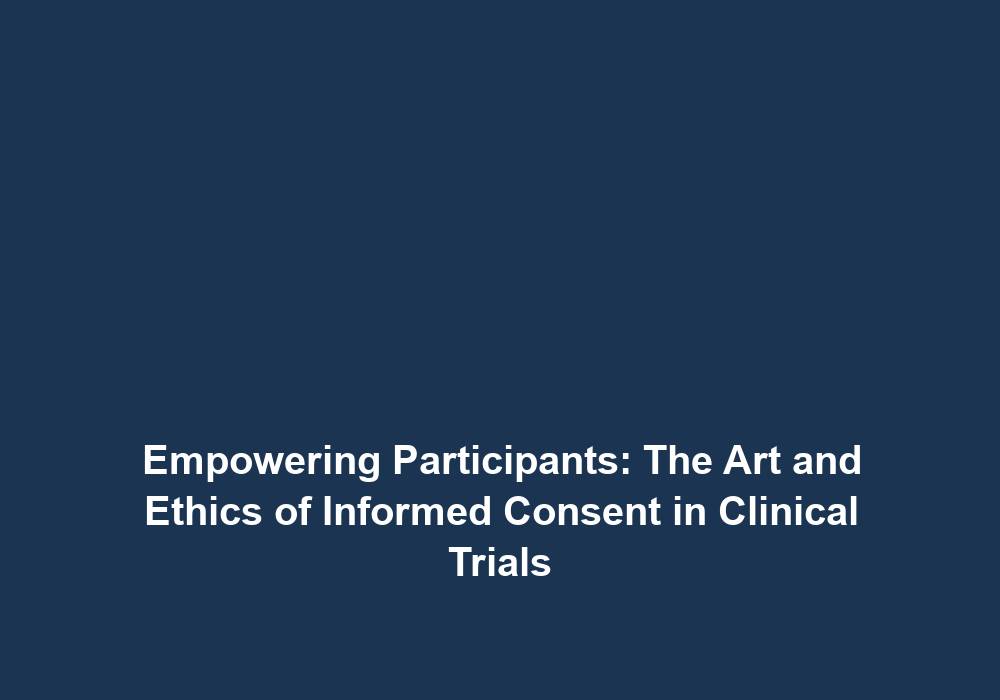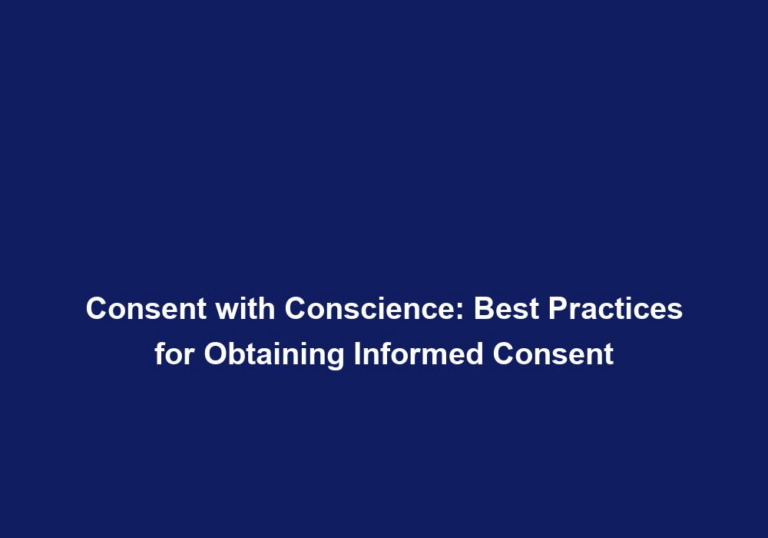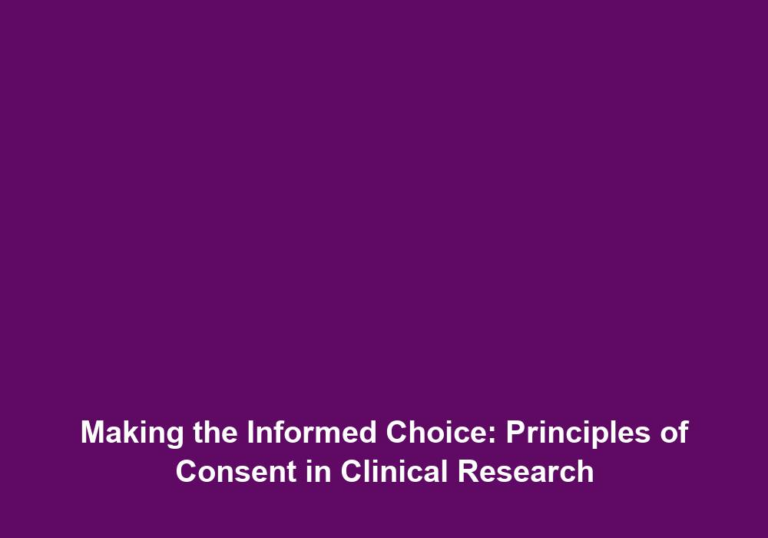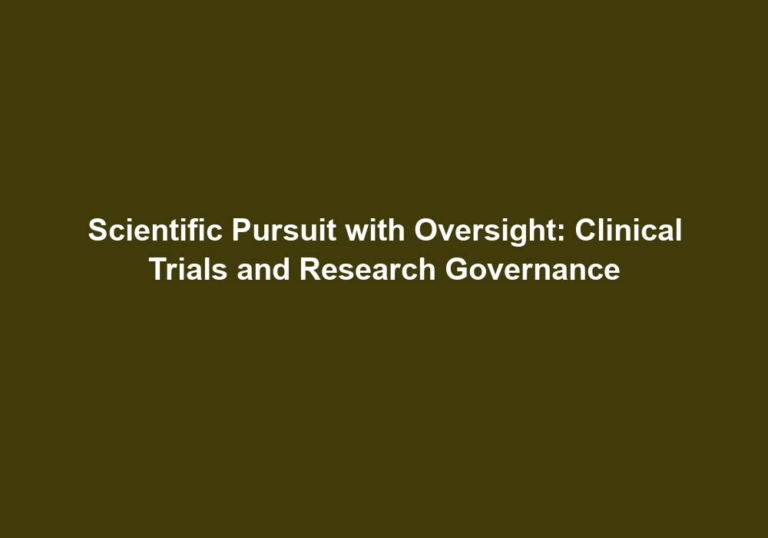Empowering Participants: The Art and Ethics of Informed Consent in Clinical Trials
Clinical trials play a crucial role in advancing medical knowledge and improving patient care. These trials are designed to evaluate the safety and efficacy of new treatments, interventions, or medical devices. However, conducting clinical trials involves ethical considerations, especially when it comes to obtaining informed consent from participants. In this article, we will explore the art and ethics of informed consent in clinical trials, focusing on how it empowers participants throughout the process.
What is Informed Consent?
Informed consent is a fundamental ethical principle that ensures individuals have sufficient information to make an autonomous and voluntary decision regarding their participation in a clinical trial. It requires researchers to provide relevant details about the study, including its purpose, procedures, potential risks and benefits, and any alternative treatments or interventions available. Informed consent also involves clarifying the participant’s rights, such as the ability to withdraw from the study at any time without facing negative consequences.
Importance of Informed Consent
Obtaining informed consent is essential for several reasons:
-
Respecting Autonomy: Informed consent upholds the principle of autonomy, allowing individuals to make decisions about their own bodies and health. It ensures that participants have the freedom to choose whether to participate in a clinical trial, based on accurate and comprehensive information.
-
Protection of Human Rights: Informed consent protects the rights and welfare of research participants. It safeguards against any potential exploitation, coercion, or violation of privacy during the trial. Participants have the right to be fully informed and involved in the decision-making process.
-
Ethical Responsibility: Researchers and healthcare professionals have an ethical obligation to obtain informed consent from potential participants. It demonstrates a commitment to transparency, honesty, and respect for the individual’s rights and well-being.
Key Elements of Informed Consent
To ensure the adequacy of informed consent, there are several key elements that should be included:
-
Comprehensibility: The information provided to participants should be clear, concise, and easily understood. Complex medical jargon should be avoided, and technical terms should be explained in simple language. Researchers should make use of visual aids, videos, or supplementary materials to enhance understanding.
-
Voluntariness: Participants must willingly and voluntarily agree to participate in the clinical trial. They should not face any coercion, undue influence, or pressure to participate. Free choice is essential for maintaining the ethical integrity of informed consent.
-
Understanding: It is crucial that participants fully understand the nature of the study, its purpose, potential risks and benefits, and any alternative treatments or interventions available. Researchers should use appropriate methods to assess the participant’s understanding and address any questions or concerns. Active listening and open dialogue play a vital role in ensuring comprehension.
-
Capacity: Individuals should have the capacity to provide informed consent, which involves the ability to understand and appreciate the information provided, weigh the risks and benefits, and make a reasoned decision. In situations where a participant lacks capacity, such as minors or individuals with cognitive impairments, additional measures should be taken to protect their interests. This may involve involving legal guardians or advocates who can make decisions on their behalf.
The Art of Informed Consent
Obtaining informed consent is not merely a checkbox exercise but an art that requires effective communication and empathy. Researchers should strive to create an environment that fosters open dialogue and encourages participants to ask questions and voice concerns. Here are some strategies to enhance the art of informed consent:
-
Clear Communication: Researchers should use plain language and avoid technical terms or jargon that might confuse participants. They should explain the study in a step-by-step manner, ensuring that the information is easily digestible and understandable. Providing examples and real-life scenarios can also help participants grasp the concept more effectively.
-
Active Listening: Actively listening to participants’ questions, concerns, and feedback is crucial. Researchers should demonstrate empathy and respond to their needs, ensuring that participants feel heard and acknowledged throughout the informed consent process. This can be achieved by maintaining eye contact, using affirmative gestures, and summarizing their concerns to show understanding.
-
Tailored Approach: Each participant is unique, with different backgrounds, educational levels, and cultural perspectives. Researchers should take these factors into account and tailor the informed consent process accordingly. Providing information in a manner that aligns with the participant’s preferences and needs improves understanding and promotes engagement. This may involve using translated materials, interpreters, or culturally sensitive resources.
-
Ongoing Communication: Informed consent is not a one-time event; it is an ongoing process. Researchers should maintain open lines of communication and provide updates and relevant information throughout the trial. This ensures that participants remain informed and empowered to make decisions regarding their continued participation. Regular check-ins, newsletters, or participant support groups can facilitate this ongoing communication.
Ethical Considerations and Challenges
While informed consent is a cornerstone of ethical research, there are challenges that researchers often face:
-
Complexity of Information: Clinical trials can involve complex medical concepts and procedures. Simplifying information without oversimplifying it is a delicate balance that researchers must strive to achieve. Visual aids, videos, or supplementary materials may be utilized to enhance understanding. Researchers should also be prepared to explain concepts in different ways to accommodate different learning styles.
-
Vulnerable Populations: Research involving vulnerable populations, such as children or individuals with limited decision-making capacity, requires additional safeguards. Researchers must ensure that appropriate measures are in place to protect the rights and welfare of these participants. This may involve seeking consent from legal guardians or obtaining assent from children, taking into account their developmental stage.
-
Language and Cultural Barriers: Participants from diverse cultural backgrounds or those with limited English proficiency may face language and cultural barriers that hinder their understanding of the study. Researchers should provide interpreters or translated materials to address these challenges effectively. Cultural sensitivity should be exercised to ensure that the information provided is culturally appropriate and relevant.
-
Influence of External Factors: Participants may be influenced by external factors, such as financial incentives or societal pressure, which can compromise the voluntary nature of informed consent. Researchers must remain vigilant to detect and mitigate any potential undue influence or coercion. This may involve regularly assessing participants’ decision-making capacity and monitoring for any signs of external influence.
In conclusion, the art and ethics of informed consent in clinical trials are crucial for empowering participants and upholding their rights. By ensuring clear communication, active listening, and an individualized approach, researchers can facilitate the informed decision-making process. Ethical considerations and challenges must be carefully addressed to protect the autonomy and well-being of research participants. Ultimately, an ethical approach to informed consent promotes trust, transparency, and the advancement of medical knowledge for the benefit of all.






